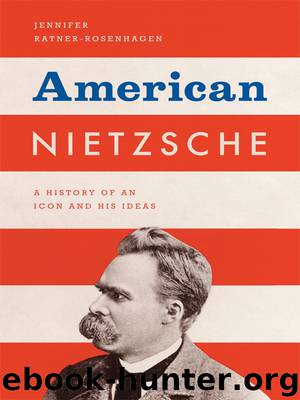American Nietzsche by Jennifer Ratner-Rosenhagen

Author:Jennifer Ratner-Rosenhagen
Language: eng
Format: epub
Publisher: The University of Chicago Press
Published: 2011-11-17T05:00:00+00:00
Nietzsche as Problem Thinker
Throughout his study, Kaufmann sought to make clear his agenda to reverse all trends in Nietzsche interpretation on both sides of the Atlantic, which cast him as either a Darwinist, a romantic, or a “wayward disciple” of Schopenhauer. Most of all, he wanted to establish Nietzsche as a serious philosopher. Kaufmann insisted that it was high time that Nietzsche be afforded his rightful “place in the grand tradition of Western thought.” In order to demonstrate that Nietzsche was “a major historical event” in the Western tradition, Kaufmann argued that it was necessary to put him in dialogue with the appropriate interlocutors: Socrates, Plato, Luther, Kant, Hegel, and Goethe. In fact, Kaufmann maintained that Nietzsche was best understood as an Enlightenment figure. Similar to Kant’s “motto” for the Enlightenment, “Have the courage to avail yourself of your own understanding” (Sapere aude!), Nietzsche defined his philosophical quest as the pursuit of intellectual self-sovereignty. “‘One thing is needed ’—namely,‘that a human being attain satisfaction with himself,’ recreate himself, and become a ‘single one’ by giving style to his character.” According to Kaufmann, though Nietzsche may have “lost the optimism of some of the men of the Enlightenment,” he spoke the same message of liberation and self-reliance, though not to “mankind” as Kant had done, but rather to “single human beings.” If Nietzsche had lost the Enlightenment faith in mankind, he still shared the Enlightenment belief in man.46
Kaufmann recognized that making room for Nietzsche in the pantheon of great Western philosophers required that he first establish the coherence of Nietzsche’s vision. In order to achieve this aim, he argued that rigorous study of Nietzsche’s ideas reveals a reasoned philosophy of “self-perfection.” Kaufmann thought that despite Nietzsche’s reputation for making “self-contradictory” claims in his writings, when placed in the larger context of his philosophy, his ideas about power, self-sovereignty, and intellectual integrity exhibited a synthetic unity. He argued that any inconsistencies or ambiguities in Nietzsche’s claims were more apparent than real. Because Nietzsche stridently “denounced” the romantics’ “protest ‘against reason, enlightenment,’” and above all, what he regarded as the “ambiguity” in their writing, Kaufmann warned that reading Nietzsche as a romantic would falsely iden-tify him “with what he fought.” He stressed that Nietzsche’s “intentions are singularly unequivocal, and he was not one to sit on both sides of the fence at once. Insofar as he had a ‘dual nature,’ he was ever seeking to overcome it.… Self-overcoming, not ambiguity, is the key to Nietzsche.”47
In arguing for the coherence of Nietzsche’s ideas, Kaufmann recognized that he also needed to account for Nietzsche’s curious aphoristic style. In Kaufmann’s estimation, readers found it difficult to understand Nietzsche because (not despite the fact that) he was such a remarkable writer. Kaufmann warned his readers that “Nietzsche’s books are easier to read but harder to understand than those of almost any other thinker.” But he insisted that Nietz-sche was more than a great stylist. In fact, Nietzsche admonished writers who let style trump substance. He criticized what
Download
This site does not store any files on its server. We only index and link to content provided by other sites. Please contact the content providers to delete copyright contents if any and email us, we'll remove relevant links or contents immediately.
| Anthropology | Archaeology |
| Philosophy | Politics & Government |
| Social Sciences | Sociology |
| Women's Studies |
The remains of the day by Kazuo Ishiguro(8961)
Tools of Titans by Timothy Ferriss(8359)
Giovanni's Room by James Baldwin(7313)
The Black Swan by Nassim Nicholas Taleb(7097)
Inner Engineering: A Yogi's Guide to Joy by Sadhguru(6782)
The Way of Zen by Alan W. Watts(6589)
Asking the Right Questions: A Guide to Critical Thinking by M. Neil Browne & Stuart M. Keeley(5751)
The Power of Now: A Guide to Spiritual Enlightenment by Eckhart Tolle(5741)
The Six Wives Of Henry VIII (WOMEN IN HISTORY) by Fraser Antonia(5493)
Astrophysics for People in a Hurry by Neil DeGrasse Tyson(5172)
Housekeeping by Marilynne Robinson(4432)
12 Rules for Life by Jordan B. Peterson(4298)
Double Down (Diary of a Wimpy Kid Book 11) by Jeff Kinney(4257)
The Ethical Slut by Janet W. Hardy(4235)
Skin in the Game by Nassim Nicholas Taleb(4231)
Ikigai by Héctor García & Francesc Miralles(4228)
The Art of Happiness by The Dalai Lama(4118)
Skin in the Game: Hidden Asymmetries in Daily Life by Nassim Nicholas Taleb(3985)
Walking by Henry David Thoreau(3948)
